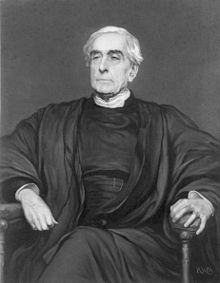W. H. Thompson
| William Hepworth Thompson | |
|---|---|

Portrait of Thompson, 1881
|
|
| Born |
27 March 1810 York, Yorkshire, England |
| Died | 1 October 1886 (aged 76) Cambridge, Cambridgeshire, England |
| Nationality | British |
| Fields | Classicist |
| Institutions | Trinity College, Cambridge |
| Alma mater | Trinity College, Cambridge |
| Spouse | Frances Elizabeth Peacock (nee Selwyn) |
William Hepworth Thompson (27 March 1810 – 1 October 1886) was an English classical scholar and Master of Trinity College, Cambridge.
Thompson was born at York and was privately educated in Buckinghamshire before entering Trinity College, Cambridge in 1828.
Graduating BA as 4th classic in 1832, he became a Fellow of Trinity in 1834. In 1853 he was appointed Professor of Greek (to which a canonry in Ely Cathedral was then for the first time attached), and in 1866 Master of Trinity College. Also in 1866, he married Frances Elizabeth, daughter of William Selwyn, widow of George Peacock. With the exception of the year 1836, when he acted as headmaster of a newly established school in Leicester, his life was divided between Cambridge and Ely. Thompson died in Cambridge, at the Master's Lodge, twenty years after being appointed Master.
Thompson had succeeded William Whewell as Master and proved a worthy successor; the twenty years of his mastership were years of progress, and he himself took an active part in the abolition of tests (in particular the compulsory religious tests) and the reform of university studies and of the college statutes. In Trinity College An Historical Sketch, G. M. Trevelyan notes:
But Thompson and the society over which he presided (1866-1886) were more ready than their predecessors to accept and even to promote changes long overdue. Trinity men were now in the forefront of the reform movement in Cambridge, no longer deprecating but welcoming the help of Parliament to remove from the living academic body the shackles of an age out-worn.
The efforts Thompson and others played an important role in transforming Trinity College and Cambridge University into more meritocratic institutions.
As a scholar Thompson devoted his attention almost entirely to Plato; and his Phaedrus (1868) and Gorgias (1871), with especially valuable introductions, remained as the standard English editions of these two dialogues for over forty years.
...
Wikipedia
